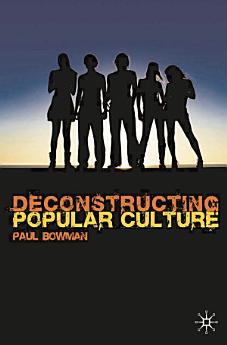Deconstructing Popular Culture
ছেপ্তে ২০১৭ · Bloomsbury Publishing
ইবুক
248
পৃষ্ঠা
reportমূল্যাংকন আৰু পৰ্যালোচনা সত্যাপন কৰা হোৱা নাই অধিক জানক
এই ইবুকখনৰ বিষয়ে
Popular culture permeates every aspect of our lives: from the music we listen to, the films and television shows we watch and the books we read. But who decides what counts as popular culture? Why is it so important? And how do we go about studying it?
This book provides a comprehensive introduction to popular culture and examines the problems and possibilities of studying this fast changing field. Employing a unique approach, Bowman uses techniques of deconstruction to unpick, analyse and deconstruct contemporary examples of popular culture. The book looks at music, Hollywood film and the self-help movement to question claims behind the importance of popular culture and encourage readers to form their own interpretations of the culture they experience every day.
With theory interwoven throughout, but in a way that is barely noticeable to the reader, the book provides covers the important theoretical work in the field, whilst directing the reader through ways to avoid common pitfalls in studying theory. An innovative user guide and glossary explain essential terms and ideas, making difficult concepts relevant, accessible and interesting. This witty, thought-provoking book provides a clear, novel introduction to popular culture for all students of cultural studies, media studies and sociology.
This book provides a comprehensive introduction to popular culture and examines the problems and possibilities of studying this fast changing field. Employing a unique approach, Bowman uses techniques of deconstruction to unpick, analyse and deconstruct contemporary examples of popular culture. The book looks at music, Hollywood film and the self-help movement to question claims behind the importance of popular culture and encourage readers to form their own interpretations of the culture they experience every day.
With theory interwoven throughout, but in a way that is barely noticeable to the reader, the book provides covers the important theoretical work in the field, whilst directing the reader through ways to avoid common pitfalls in studying theory. An innovative user guide and glossary explain essential terms and ideas, making difficult concepts relevant, accessible and interesting. This witty, thought-provoking book provides a clear, novel introduction to popular culture for all students of cultural studies, media studies and sociology.
লিখকৰ বিষয়ে
PAUL BOWMAN is Senior Lecturer in Cultural Studies at Cardiff University. His previous books include Interrogating Cultural Studies, Post-Marxism versus Cultural Studies and The Truth of Žižek.
এই ইবুকখনক মূল্যাংকন কৰক
আমাক আপোনাৰ মতামত জনাওক।
পঢ়াৰ নির্দেশাৱলী
স্মাৰ্টফ’ন আৰু টেবলেট
Android আৰু iPad/iPhoneৰ বাবে Google Play Books এপটো ইনষ্টল কৰক। ই স্বয়ংক্রিয়ভাৱে আপোনাৰ একাউণ্টৰ সৈতে ছিংক হয় আৰু আপুনি য'তে নাথাকক ত'তেই কোনো অডিঅ'বুক অনলাইন বা অফলাইনত শুনিবলৈ সুবিধা দিয়ে।
লেপটপ আৰু কম্পিউটাৰ
আপুনি কম্পিউটাৰৰ ৱেব ব্রাউজাৰ ব্যৱহাৰ কৰি Google Playত কিনা অডিঅ'বুকসমূহ শুনিব পাৰে।
ই-ৰীডাৰ আৰু অন্য ডিভাইচ
Kobo eReadersৰ দৰে ই-চিয়াঁহীৰ ডিভাইচসমূহত পঢ়িবলৈ, আপুনি এটা ফাইল ডাউনল’ড কৰি সেইটো আপোনাৰ ডিভাইচলৈ স্থানান্তৰণ কৰিব লাগিব। সমৰ্থিত ই-ৰিডাৰলৈ ফাইলটো কেনেকৈ স্থানান্তৰ কৰিব জানিবলৈ সহায় কেন্দ্ৰত থকা সবিশেষ নিৰ্দেশাৱলী চাওক।








